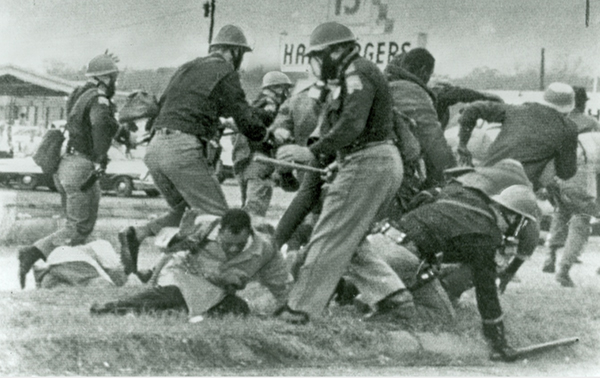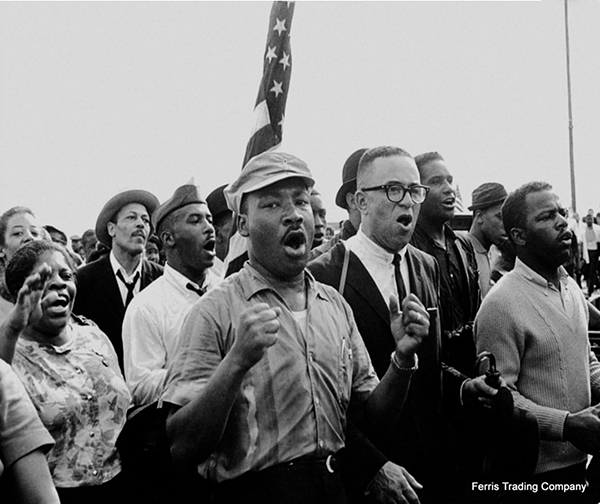
Image, Courtesy of Library of Congress.
As new laws to protect the right to vote are being sabotaged in Congress, it’s important to remember that the right to vote was not some gift bestowed by the powerful. Mass action wrested the right to vote from the rulers of this country. Today, it will take more mass action by millions to preserve that right.
The most important law guaranteeing the right to vote is the Voting Rights Act of 1965. It outlawed racial discrimination in voting, especially in the South.
The official name – or “long title” – of the Voting Rights Act is “An Act to enforce the Fifteenth Amendment of the Constitution of the United States, and for other purposes.” The Fifteenth Amendment – ratified in 1870 – prohibited states from denying a male citizen the right to vote based on “race, color, or previous condition of servitude.” It was one of the Reconstruction Amendments passed after the Civil War. More than 300,000 Union Army soldiers died in that bitter struggle to preserve the Union and end slavery. The blood they shed on the battlefield made possible the ink on the parchment of the Fifteenth Amendment.
After the Civil War, the violent overthrow of the Reconstruction state governments in the former Confederacy put an end to the right to vote for virtually all African Americans and many poor whites as well. This long night of oppression lasted for decades, but could not last forever. After the Second World War, black soldiers who had fought for freedom overseas refused to accept second-class citizenship at home. Out of their defiance the post-war civil rights movement was born. This movement eventually involved tens of thousands of activists and won the respect and support of millions of people. Efforts like the Montgomery, Alabama bus boycott of 1955 were gigantic organizational undertakings which required the dedicated activity of massive numbers of people, not just one or two heroic leaders. The same can be said for the 1963 March on Washington, an action which brought 250,000 people to the Lincoln Memorial.
Throughout the late 1940s and 1950s, attempts to register African Americans to vote were met with brutal repression. In Selma, Alabama, the Dallas County Voters League (DCVL) began working to register African American voters in the late 1950s and 1960s. These efforts were joined later by the Student Nonviolent Coordinating Committee (SNCC) and the Southern Christian Leadership Conference led by Martin Luther King.
On Feb. 18, 1965, a night demonstration for voting rights at the Marion, Alabama, court house was attacked by Alabama state troopers. The troopers clubbed marchers and beat and shot Jimmie Lee Jackson, an unarmed 26-year-old marcher. Jackson died days later.
The death of Jimmie Lee Jackson intensified the fight for voting rights in Selma, Alabama. On Sunday, March 7, 1965, some 600 marchers headed for the arched Edmund Pettus Bridge in Selma that crossed the Alabama River. As the demonstrators attempted to cross the bridge, state troopers armed with clubs, whips, and teargas attacked the marchers – clubbing and whipping them, fracturing bones, and gashing heads. Seventeen people were hospitalized. The day became known as “Bloody Sunday.”
“Bloody Sunday” shocked the conscience of America. Concerned people responded to the call issued by the Rev. Dr. Martin Luther King to come to Selma to prepare for another, bigger march. On the night of March 9, 1965, a mob of white racists beat and murdered the Rev. James Reeb, a Unitarian Universalist minister from Boston.
As outrage at the violence in Selma spread across the country, national political leaders were forced to respond. President Lyndon Johnson had said nothing about voting rights in his inaugural address given just weeks before the violence in Selma — despite having won a landslide victory in the 1964 presidential election. Some of his advisors had cautioned him about the political costs of vigorously pursuing a voting rights bill so soon after the U.S. Congress had passed the Civil Rights Act of 1964. Johnson was also worried that championing voting rights would imperil his Great Society programs by angering Southern Democrats in Congress.
However, in the wake of the violence in Selma, on March 15, 1965, Johnson addressed a televised joint session of Congress, calling on the legislators to enact a strong voting rights bill. He concluded his speech with the words “we shall overcome.” Two days later, the Voting Rights Act was introduced in Congress.
On March 21, 1965, more than 3,000 people began a march from Selma to the state capitol in Montgomery. One historical account said of the march that it included “blacks, whites, doctors, nurses, working-class people, priests, nuns, rabbis, homemakers, students, actors, and farmers.” On March 25, the marchers reached the state capitol building where a Confederate flag was flying overhead. The crowd had grown to 25,000 people, the largest civil rights demonstration in the city’s history. After the march concluded, a car filled with Klansmen pulled up beside the car driven by civil rights volunteer Viola Liuzzo and fired two bullets into her head, killing her.
The brutal violence and mass protest in the South created an unstoppable momentum. After weeks of debate, both houses of Congress passed the Voting Rights Act. In early August 1965, President Johnson signed the act into law in a White House ceremony at which civil rights leaders Martin Luther King, John Lewis, and Rosa Parks were present.
The Voting Rights Act was a tremendous step forward, but it was certainly not a gift. It was won with the blood of Jimmie Lee Jackson, Rev. James Reeb, and Viola Liuzzo and many others who gave their lives in the fight for civil rights. It was the product of years of organizing, marching, and sacrifice by vast numbers of people.
Today, as powerful forces move to deprive millions of the right to vote, we should remember the bitter struggle it took to win that right. The only way to preserve the right to vote today is to return to the bold tactics that brought it into being.
Chris Mahin is a writer, speaker and teacher on contemporary U.S. politics and history, particularly on the significance of the American Revolutionary War and Civil war eras for today. He is the Electoral Desk on the People’s Tribune Editorial Board.

